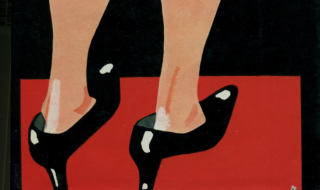Last month, Sunderland footballer Adam Johnson was sentenced to 6 years in prison for sexual activity with a child. Details emerging from the case included the fact that the victim had just turned 15 when Johnson began grooming her, that Johnson conducted an internet search on the legal age of consent, and that the pair exchanged flirtatious WhatsApp messages after he gave her two signed Sunderland shirts. Johnson’s celebrity status was undoubtedly the primary factor in propelling Johnson’s case into the headlines and public interest, but there remained a secondary interest in the victim: she was a fan of the club and ‘idolized’ Johnson, and had hung around after games in the hope of meeting him. They exchanged 834 WhatsApp messages in two months. She was 15 years old – not 12, or 10, or 8. She looked and acted older – something people told her all the time. These were details which would later be evoked to challenge the girl’s credibility as a victim.
See how the media mourned the ‘promising futures’ of football players who repeatedly sexually assaulted an unconscious young woman in Steubenville, Ohio in 2012
Adolescent female sexuality and agency was a big topic on public media platforms. Katie Hopkins (not the best reflection of our times, although the levels of support her opinions receive might say differently) wrote in her Mail Online column that the victim knew ‘exactly what she was doing’, and questioned the accuracy of defining the 15-year-old as a child. Dr Christian Jessen (of Embarrassing Bodies) joined the debate, tweeting his support for Hopkins’ stance and highlighting the hypocrisy of the legal age of consent being 16 but the age of criminal responsibility being 10. Victoria Coren Mitchell wrote in the Guardian in support of absolutist consent laws in order to protect all minors – ‘we’ve got to define [the age in which a person is considered a child] somehow, and that’s how’.
Katie Hopkins was onto nothing new – we all know many underage adolescents are sexually active, having all been underage adolescents ourselves at some point – but public acknowledgement of this is unusual. That this discussion is being had in light of whether a well-off, well-liked sportsman should receive a lighter sentence (or any sentence at all) is unsurprising. There is a tendency in our society to bemoan the now darkened future of respectable young men with a talent (often sports) who happen also to be convicted rapists – see how national media mourned the ‘promising futures’ of football players who repeatedly sexually assaulted an unconscious young woman in Steubenville, Ohio in 2012, and The Washington Post’s description of how 20-year Brock Turner’s ‘extraordinary yet brief swim career is now tarnished, like a rusting trophy’ (he was found guilty of raping a woman who did not regain consciousness until 3 hours after the attack).
We can’t have a nuanced discussion about this until we publicly acknowledge and accept adolescent sexual agency
In short, the conversation about young female sexual agency is currently centered around how the accountability of older men in rape and sexual assault cases can be diminished, and how the victim can accept more blame for her trauma. This feeds into preexisting narratives in society which posit men as the hapless victims of calculating female temptresses – think of ‘homewreckers ‘and ‘bunny boilers’ as modern day real-life mermaids and sirens – and which wants preventative measures like school dress codes for under-16s and social media censorship of female body parts as a way of keeping men safe from the irresistible allure of women and girls.
But this does not mean that the conversation about young female sexual agency is not one we should be having. There are so many current issues surrounding teenage sexuality that we cannot have a nuanced discussion about it, for young women and men to benefit from, until we publicly acknowledge and accept adolescent sexual agency. Unfortunately, at present, it is only debated in the interest of well-off, well-liked, older males.
50% of young people did not learn from Sex and Relationships Education in school how to get help if they were abused
Nearly half of women aged 16-24 said they wished they’d waited longer before having sex, and were twice as likely to say this if they were under 15 when they lost their virginity. US podcast ‘This American Life’ explored ideas about consent among college freshmen, ultimately concluding that there existed such an adversity among young men to the thought of actively obtaining consent because there lacked a strong dialogue between young men and women about sex in the first place. 2009 research showed that 29% of 13-17 year olds had experienced sexual violence in their relationships. I look back at high school and sixth-form and the situations that happened that now, my adult female friends and I would easily define – rape, sexual assault, abuse, manipulation – but how back then, still trying to find our feet in understanding and participating in relationships, we could only make sense of by accepting and assuming it was normal. PSHE lessons really were no help at all, and we were unlikely to seek help or clarification from adults. It’s painful to imagine that’s how young women are still growing up today, as while it is compulsory that Sex and Relationships Education (SRE) is taught to children 11 years old and upwards, parents can choose to withdraw their children from these sessions and there remains huge gaps in what is being taught to children; the Sex Education Forum released statistics from a study of 2000 young people stating that 50% of young people did not learn from SRE how to get help if they were abused, and more than 4 in 10 had not learned about healthy or abusive relationships. In addition to this, LGBTI children are at an even higher risk of receiving an incomplete SRE.
Having an open, public discussion about young female sexual agency would destigmatize and bring these issues to headlines and educational bodies. Unfortunately, as it is, our society cares less about the long-term physical, mental, emotional and sexual health of teenage women and more about absolving the men who hurt them of blame.



